- search 182 views
- file_download 17 download
- keyboard_capslock metadata
-
mark_email_readIscriviti alla newsletter
Tortura e disagio psichico tra i rifugiati e i richiedenti asilo
Presa in carico e intervento psico-sociale
abstract
In recent years there has been a progressive rise in the number of asylum seekers and refugees displaced from their country of origin, with significant social, economic, humanitarian and public health implications. In comparison with the general population, refugees and asylum seekers have been shown to experience higher prevalence rates of a range of disorders, including Post-Traumatic Stress Disorder (PTSD). Although there is substantial variability in prevalence rates, PTSD is frequent and is much more likely in refugees and asylum seekers compared to host populations. In terms of psychosocial interventions, cognitive behavioral interventions and narrative exposure therapy are supported by some evidence of efficacy that would suggest the possibility of decreasing PTSD symptoms in this vulnerable group. Overall, psychosocial interventions for asylum seekers and refugees with PTSD were found to provide significant benefits in reducing PTSD symptoms. Therefore these data provide an evidence base to inform decisions in clinical practice and in policy making, considering that an appropriate treatment is a right of refugees and a way to better adaptation and integration in hosted country.
Keywords: Asylum seekers • Mental health • Post-traumatic stress disorder • Psychological distress • Refugees




